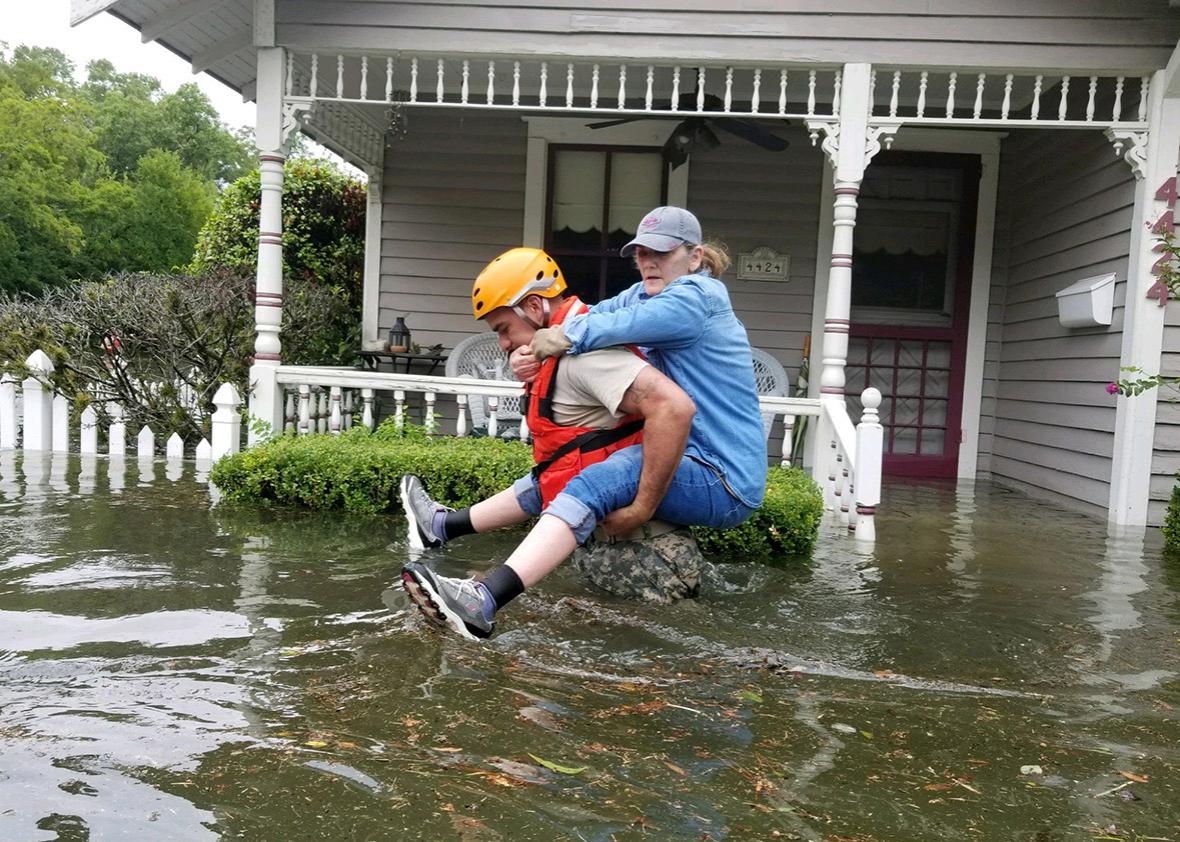With the debilitating rain in Houston fell a rain of inspiriting images. Everywhere on Twitter, in the papers, in internet slideshows, we saw Texans improvising rescue canoes and gathering scared dogs in their arms, bearing them away to safety. First responders waded into the water-choked arteries of the city and dragged people out of cars. Uniformed men hoisted grandmothers on their backs (like Jason fording the river with the goddess Hera on his shoulders) while, elsewhere in the country, beer companies filled cans with fresh water and celebrities spearheaded donation drives.
The flood, the animals: It all felt so mythic. In coverage of Harvey, the word hero is almost as ubiquitous as the stills of intrepid reporters, their rain slickers swirling like capes, and hunky National Guardsmen in life jackets. During a speech to the press on Monday, President Donald Trump noted that crisis showcases “the best in America’s character—strength, charity, and resilience.” (This was a reprieve from his popcorn-gobbling tweets about Harvey’s unprecedented, riveting destruction.) The Washington Times echoed Trump with a piece spotlighting the many Clark Kents and Diana Princes vaulting into action: “Hurricane Harvey Brings Out the Best in America.” There is an adage that “adversity doesn’t build character, it reveals it.”
But does catastrophe illustrate, or does it transform? What if America is less a glorious nation of do-gooders awaiting the chance to exercise their altruism than a moral junior varsity team elevated by circumstance? In her book A Paradise Built in Hell: The Extraordinary Communities That Arise in Disaster, Rebecca Solnit argues that emergencies provoke from us a conditional virtue. They create provisional utopias, communities in which the usual—selfish, capitalistic—rules don’t apply. “Imagine a society,” Solnit writes, “where the fate that faces [people], no matter how grim, is far less so for being shared, where much once considered impossible, both good and bad, is now possible or present, and where the moment is so pressing that old complaints and worries fall away, where people feel important, purposeful, at the center of the world.”
The point here is obviously not to diminish the bighearted men and women who rose to the occasion when Harvey, a “once-in-a-lifetime” storm with a spiraling death toll, slammed into Texas. But it is misleading to characterize Houston as an exhibition of the “best of America” when what it represents is a contingent America, a “paradise” specific to the “hell” around it. These waterlogged suburbs have become zones of exemption, where norms hang suspended and something lovelier and more communal has been allowed to flourish in their place. Disaster scientists have repeatedly punctured the myth, perpetuated by Hollywood and the media, that cataclysm awakens our worst selves. Rather, disruptive events loosen our mores just enough to permit new kinds of compassion. As Slate reported in the aftermath of Hurricane Sandy, researchers at the University of Colorado–Boulder discovered “that panic is not a problem in disasters; that rather than helplessly awaiting outside aid, members of the public behave proactively and prosocially to assist one another; that community residents themselves perform many critical disaster tasks, such as searching for and rescuing victims; and that both social cohesiveness and informal mechanisms of social control increase during disasters, resulting in a lower incidence of deviant behavior.”
These findings put a frame around the cooperative society that has lately emerged in Houston: It is a beautiful anomaly, a liquid note of silver momentarily liberated from its sheath of rust. The inverse of such a phenomenon is the bystander effect, by which individuals might walk past someone prone in the street without offering aid. We rarely feel responsible for a stranger’s suffering if others around us seem unmoved or if we can comfortably assume that some nearby person will step in to help instead. Humans may possess inherent goodness, but that goodness needs to be activated. Some signal has to disperse the cloud of moral Novocain around us. Some person, or fire, or flood, has got to say: now.
